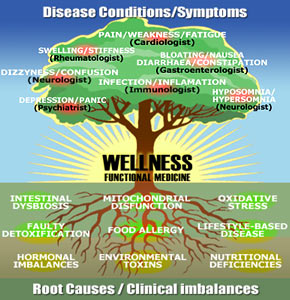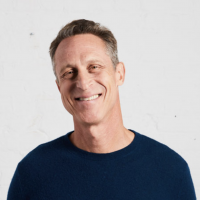
Editor’s Note: This website is not designed to, and should not be construed to, provide medical advice, professional diagnosis, opinion or treatment to you or any other individual, and is not intended as a substitute for medical or professional care and treatment. For serious.
~
Cancer is Never a Death Sentence. Here’s a Different Approach…
When we hear someone we love has cancer or if we’re diagnosed ourselves, we feel a grim prognosis. But the worst thing we can do is to succumb to hopelessness. Being diagnosed with cancer does not automatically entail a death sentence.
Instead of asking what disease we have and what drug should be used to treat it—as conventional medicine does—we must ask why the disease has occurred. In this case, what underlying causes lead to cancer?
Functional medicine is a systems-biology approach to personalized medicine that focuses on the underlying causes of disease. It is the medicine of why, not what.
Numerous things can contribute to cancer. Studies show diet, exercise, thoughts, feelings and environmental toxins all influence the initiation, growth and progression of cancer.
If a nutrient-poor diet full of sugar, lack of exercise, chronic stress, persistent pollutants and heavy metals can cause cancer, could it be that a nutrient-dense, plant-based diet, physical activity, changing thoughts and reactions to stress and detoxification might treat the garden in which cancer grows?
I don’t want to oversimplify cancer, but I want to be clear that dietary and lifestyle factors can significantly impact this devastating disease.
The best thing we can do to prevent or control cancer is to control insulin levels with a real, fresh, whole foods, high-fiber diet that minimizes or eliminates sugary, processed insulin-raising foods.
Dr. Dean Ornish showed that after just three months on an intensive lifestyle program, including a whole-foods plant-based diet, over 500 genes that regulate cancer were beneficially affected, either turning off the cancer-causing genes or turning on the cancer-protective genes.[1] No medication can do that.
Cancer results from an imbalance in our system where the immune system can’t fight off tumors. We can do many things to prevent that cancer from getting to its full stage, and if we have cancer, we can possibly make our body inhospitable to that cancer with these strategies:
- Eliminate food sensitivities. In a major study in the Journal of the American Medical Association, hidden gluten sensitivity was shown to increase risk of death by 35 to 75 percent, mostly by causing heart disease and cancer.[2] By just this mechanism alone, more than 20 million Americans are at risk for heart attack, obesity, cancer and death. Dairy and gluten are the most common triggers of food allergies linked to insulin resistance. Temporarily cutting them out of the diet allows the inflamed gut and an inflamed body to heal.
- Reduce inflammation. Inflammation is the common thread connecting most chronic diseases, including cancer. We can reduce inflammation with anti-inflammatory foods, including omega-3 rich foods like wild fish and flaxseeds.
- Improve gut health. Cancer often originates in our gut: Not just colon cancer, but with many cancers. There are currently studies being done on the connection between the gut micro-biome and breast and prostate cancers. Beyond avoiding inflammatory foods, we can reduce gut-based inflammation with probiotics, prebiotics and phytonutrients found in plants like curcumin and resveratrol.
- Reduce toxic exposure. The average newborn has 287 chemicals in his or her umbilical cord blood, 217 of which are neurotoxic.[3] These chemicals have a broad range of negative effects on human biology; they damage the nervous system and increase the risk of cancer. They’ve also been shown to contribute to obesity. Going clean and green means becoming more aware about how environmental toxins affect our health. Visit the Environmental Working Group (EWG) to learn more.
- Change our thoughts to change our immune system. Science shows how we live, our relationship quality, the food we eat, how we use our bodies and the environment that washes over us, determines much more than our genes ever will.
There are numerous strategies to combat or prevent cancer, including sufficient sleep, controlling stress levels and exercising regularly. Numerous supplements, including curcumin and vitamin D, can also help through various mechanisms.
The important thing is to figure out what works for you and develop a plan to stick with it. That might involve working with a functional medicine doctor, chronic disease specialist or nutritionist.
Even if we don’t have cancer, the preventative measures cultivate a healthy soil to create an environment inhospitable to cancer.
It’s scary, but there are things we can do. Please don’t lose hope.
Most people reading this will have experienced cancer, either personally or with family and friends. Did you find a particular mindset helped you cope with the news? Did a particular dietary or lifestyle strategy help you in this situation? Share your story below or on my Facebook page.
~
References
[1] Ornish D, et al. Changes in prostate gene expression in men undergoing an intensive nutrition and lifestyle intervention. Proc Natl Acad Sci U S A. 2008 Jun 17;105( 24): 8369– 74.
[2] Ludvigsson JF, et al. Small-intestinal histopathology and mortality risk in celiac disease. JAMA. 2009 Sep 16;302( 11): 1171– 78.
[3] http:// www.ewg.org/ reports/ bodyburden2/ newsrelease.php.
~
Author: Mark Hyman
Editor: Rachel Nussbaum
Photo: Google Images for Reuse


 Share on bsky
Share on bsky




Read 1 comment and reply